Egyptian tech tree for World of Tanks proposal by PikPikker
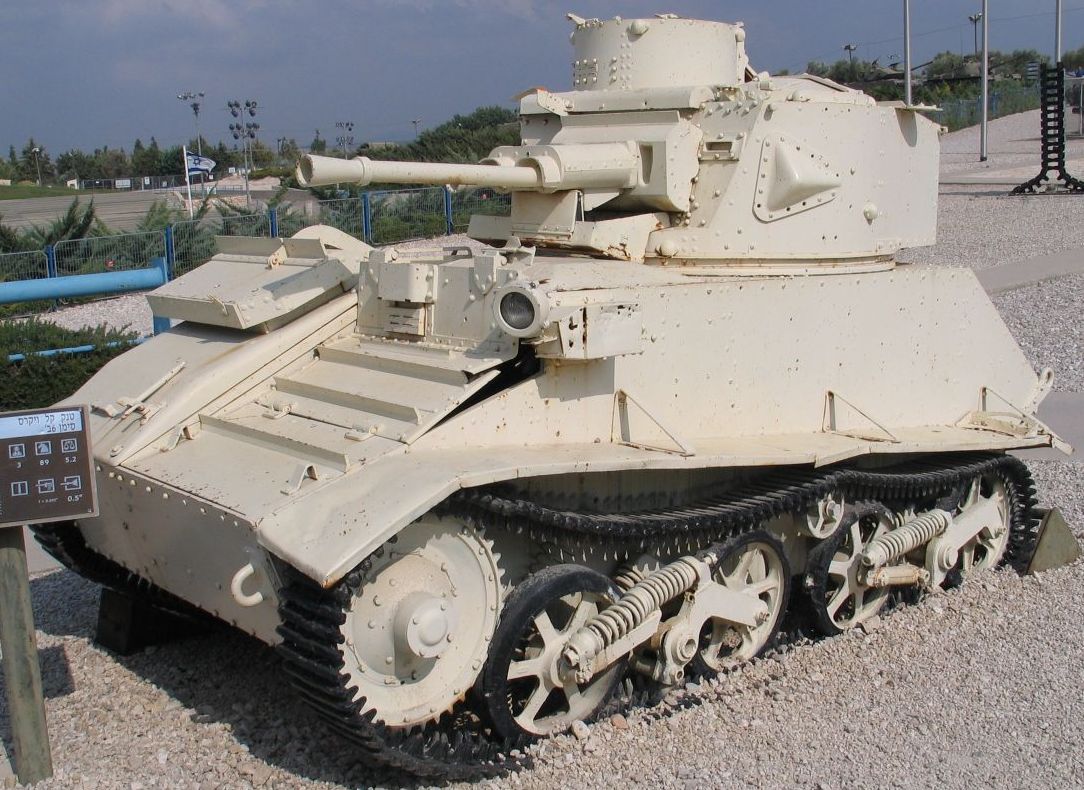
It's possible to use the double gun on tier 1.
- 14/14/14 mm
- 88 hp

These Vickers Light Tanks were seen in the 1948 Arab-Israeli War with Egyptian forces. Some sources state there were about 70 such LT Mk. VI tanks in the Egyptian Army.


- 42/30/30 mm
- 42+/30/30 mm
- 125 hp
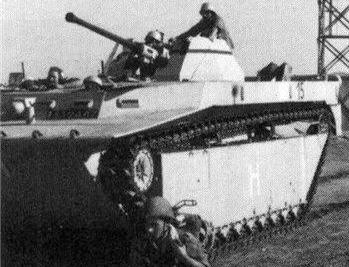
In summer 1948 the Battle of Negba (it's a location in Israel now) between Israeli and Egyptian forces took place. Egyptians had a couple of M13/40 tanks, and at least one of them had another turret (with thicker steel plate) with 2-pdr gun (photo).
Originally an Italian tank, M13/40 must have languished in Egypt since about 1943, when Italy left North Africa.


- 38/25/25 mm
- 38/25/25 mm
- ~25 mm
- 250 hp
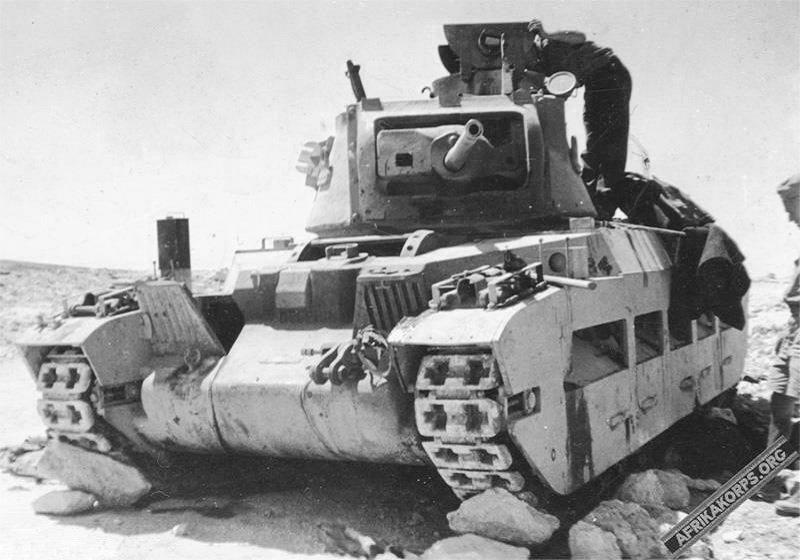
These LVTs were used by Egypt in 1956 in Suez Crysis. Some sources say that this modification originally came from France, where it was built in 1950, the transformation is carried out on the instructions of the captain of La Chapelle. It's obvious it means that some amount of these tanks were captured by the Egyptian forces.
Notice that this is an amphibious vehicle - that's why it has a special mark in the tree being currently unavailable for the game. But some sources say that such tanks will be introduced into game some time, so it will be possible.

40 mm Bofors gun can be installed to make an interesting difference between the British version, but it's unhistorical.

- 75/75/75 mm
- 75/75/75 mm
- 174 hp
- 190 hp

There's not much information about Matilda's in Egypt, but some data shows that about 100 Matilda tanks were shipped to Egypt in 1940-41 during the Lend-Lease program. At least 2 tanks were used in Battle of Negba in 1948.


- 49/20/25 mm
- 51/24/30 mm
- 340 hp
- 340 hp

According to some sources, during the Lend-Lease program in 1941 about 200 Crusader tanks were delivered to Egypt. It's also possible that the last of them (Mk. III) that still were in service were used in Suez Crysis in 1956.


- 76/51/51 mm
- 40/20/20 mm
- 370 hp
- 375 hp
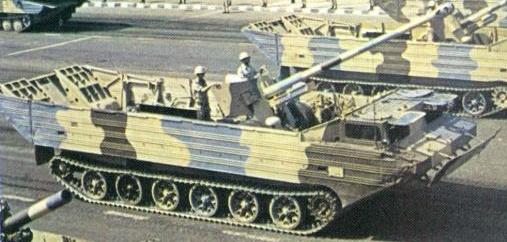
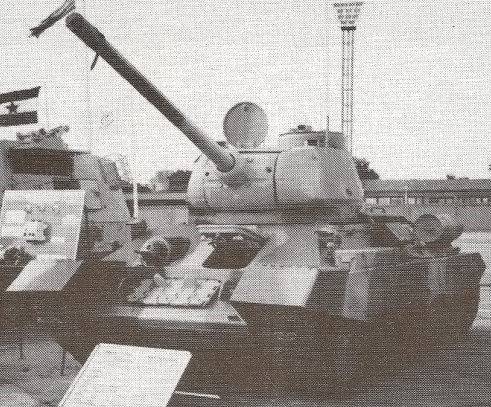
This unique tank is a M4A4 Sherman with FL-10 turret (and its gun) from AMX-13, and with GM diesel from M4A2. It was produced in 1955 by France in small amounts (about 20 tanks by some sources) for the needs of the Egyptian Army. M4A1 and M4A2 Shermans also were modernized by the same way, while M4A1 with FL-10 is considered to be a prototype of widely produced M4A4/FL10. These tanks were used by Egypt during Suez Crysis (1956) and Six-Day War (1967), but almost all of them were captured or destroyed by Israel.
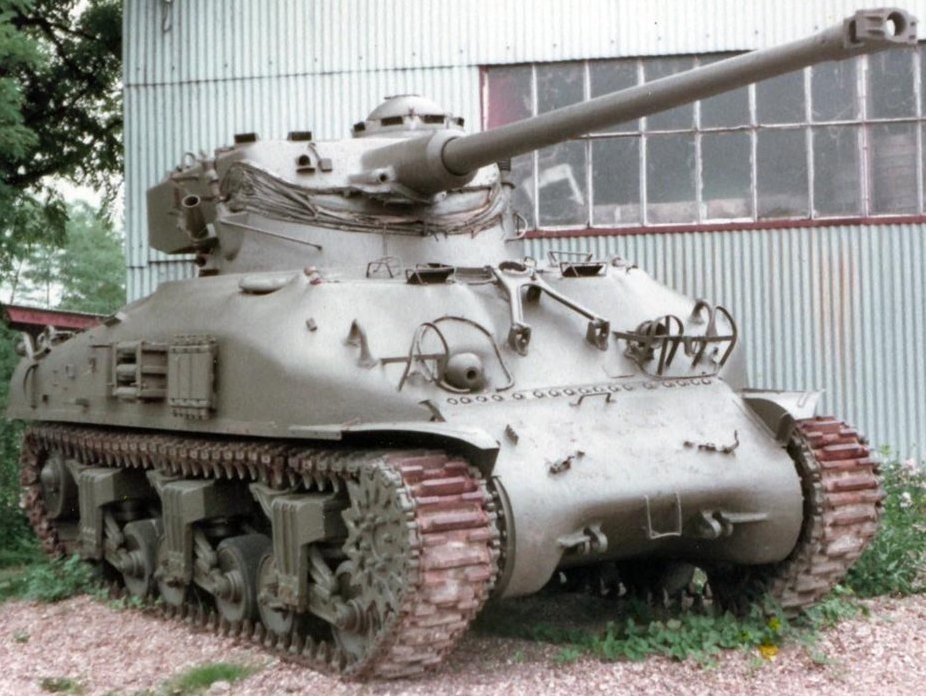
- 40/20/20 mm
- 400 hp
This unique tank is a M4A1 Sherman with FL-10 turret (and its gun) from AMX-13. It was produced in 1955 by France in small amounts for the needs of the Egyptian Army. M4A4 and M4A2 Shermans also were modernized by the same way, while M4A1 with FL-10 is considered to be a prototype of widely produced M4A4/FL10. These tanks were used by Egypt during Suez Crysis (1956) and Six-Day War (1967), but almost all of them were captured or destroyed by Israel.
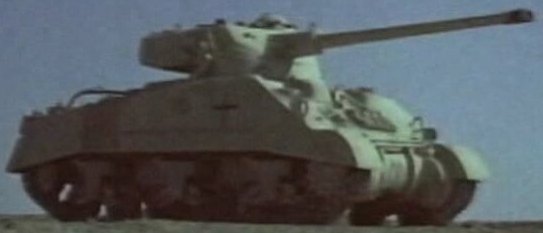
- 40/20/20 mm
- 375 hp
This unique tank is a M4A2 Sherman with FL-10 turret (and its gun) from AMX-13. It was produced in 1955 by France in small amounts (about 20 tanks by some sources) for the needs of the Egyptian Army. M4A1 and M4A4 Shermans also were modernized by the same way, while M4A1 with FL-10 is considered to be a prototype of widely produced M4A4/FL10. These tanks were used by Egypt during Suez Crysis (1956) and Six-Day War (1967), but almost all of them were captured or destroyed by Israel.

- 200/160/65 mm
- 520 hp
In 1980's, as a part of a long "Ramses-II" development program, there was an idea just to re-arm T-54s with 105 mm M68 (L7) gun to simplify the production. This T-54A prototype was seen during the 1989 parade. Such program of rearming existing tanks was declined soon to continue works on Ramses II tank.


- Uses more powerful ammunition
- 90/75/52 mm
- 500 hp
- 580 hp
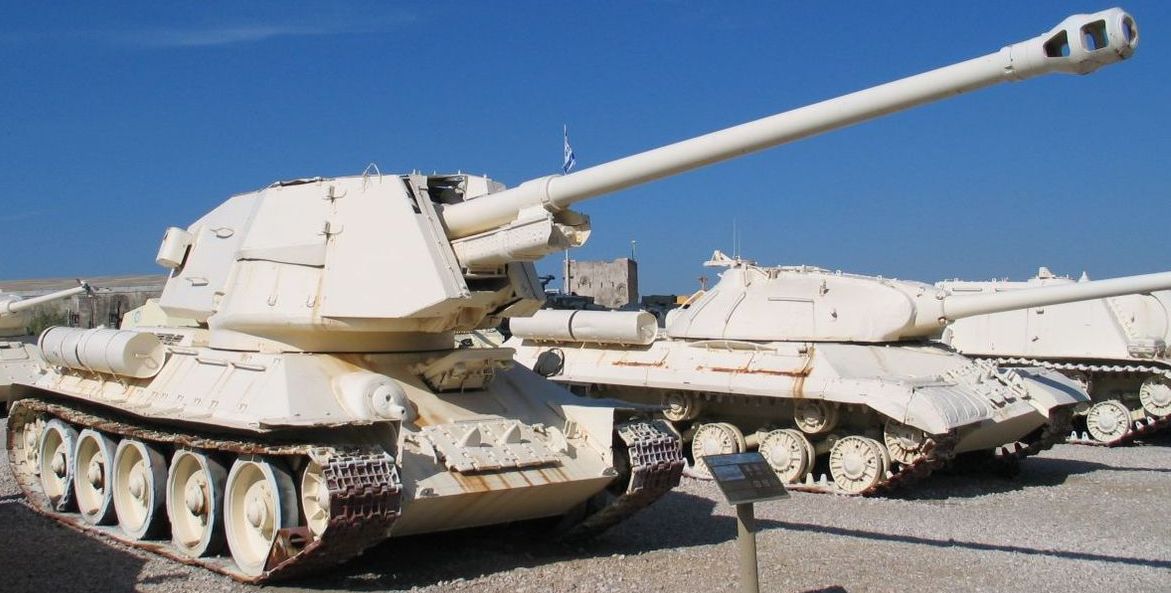
Egyptian modernization of T-34-85: it was fitted with parts of T-55 - mainly roadwheels, possibly suspension and engine. The most interesting fact it was classified by Egyptians as a light tank, though nothing more is known.

- 300 hp
This integesting SPG - mointing D-30 howitzer on chassis of BMP-1 - was found in Egypt in 2017, being the only built vehicle.
Notice that this is an amphibious vehicle - that's why it has a special mark in the tree being currently unavailable for the game. But some sources say that such tanks will be introduced into game some time, so it will be possible.

M-30 howitzer can be seen on another PTS-M (in the corner of this picture).

- 350 hp
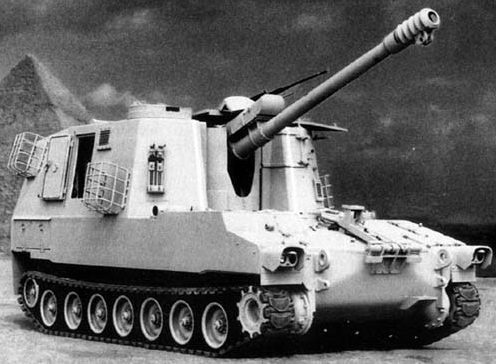
PTS and PTS-M transporters were delivered to Egypt in 1973 where they were used to carry guns - at least BS-3 and M-30. Notice that the guns were just carried, the vehicle wasn't used as a tank destroyer.
Notice that this is an amphibious vehicle - that's why it has a special mark in the tree being currently unavailable for the game. But some sources say that such tanks will be introduced into game some time, so it will be possible.


- ~45 mm (?)
- 493 hp
- 500 hp
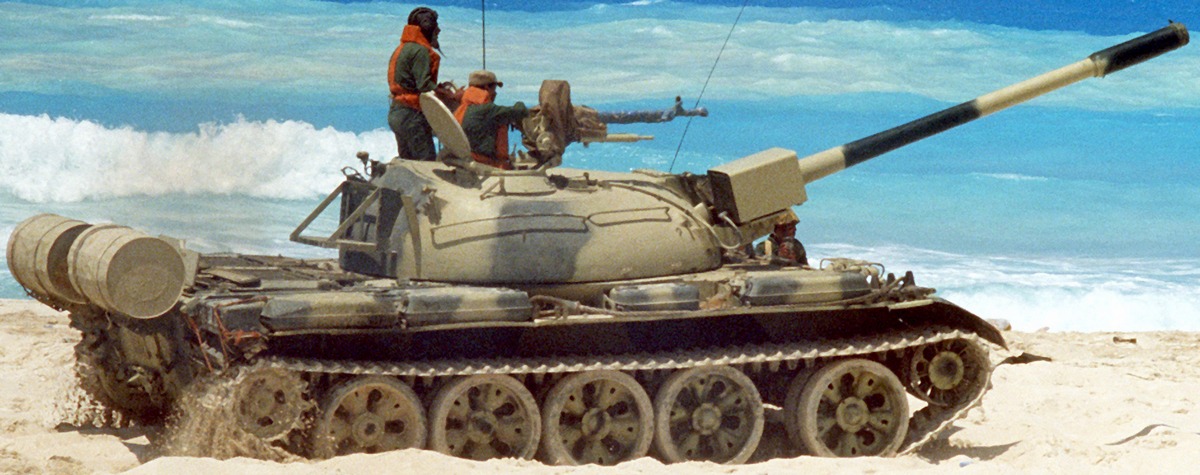
The Egyptian Army found itself with a tank destroyer requirement and it was decided to fit their Soviet BS-3 guns into modified T-34/85 turrets while keeping the original T-34/85 tank chassis intact. The turret was essentially retained in its original form with the exception of angled steel plate extensions being welded to the front, top and rear facings. This resulted in a considerably altered appearance from the original T-34/85 as the long 100 mm barrel protruded over the bow of the hull (this quality known simply as "barrel hang") and was capped with a double-baffled muzzle brake to combat the gun's inherent recoil action. Additionally, a dedicated recoil mechanism was installed just under the barrel base near the turret to help further dispel recoil effects. The turret sat in its original ring along the forward portion of the hull though the turret armor extensions forced the turret to spread out over the turret roof to an extent.
While the T-100 proved itself a capable derivative of the T-34 family line, the system was soon found lacking in the required qualities for the modern battlefield by the time of the 1973 Yom Kipper War against Israel. By this time, the armor protection of the World War 2-era T-34 tanks were no longer capable of contending with the armor-piercing weaponry available to the Israelis - these coming from American 105 mm armed M48 medium tanks and British Centurion main battle tanks along with general guided anti-tank implements. As such, the T-100 was forced into more defensive-minded roles than initially envisioned, thusly allowing it to bring its 100 mm main gun to bear from prepared positions and hopefully against unsuspecting foes.

- 300 hp
SP122 first prototypes were built in 1984. BMY version used M109A2 chassis while RO version was a totally new vehicle, being much smaller than the BMY one. During the tests in the late 1980s Egyptian Army chose BMY version as it used M109 parts, so it would be better in service, but in general such a little weapon in such a big tank looked like a disappointment.
It's gun is actually a howitzer, having HE and HESH rounds. As a TD this tank must get HESH rounds as basic type, and penetration would be a value based only on the balance. It's because the real penetration of HESH of this gun was 400-460 mm.

Early T-55E Mk.I could be without applique armor.

- 200/160/65 mm
- 200/160/65 mm
- 580 hp
- 650 hp
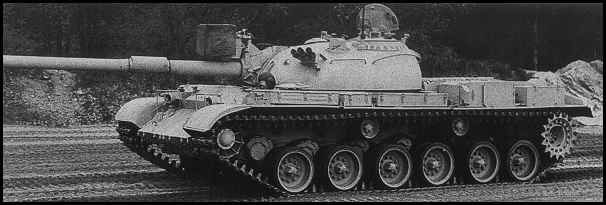
Egypt used unmodified T-54 and T-55s in 1967 and 1973 - there were more than 2500 tanks, and later some of them were upgraded. T-55E Mark 0 ("E" stands for Egyptian variant) - T-55 modernization fitted with a new Russian engine developing 580 hp. It came in two variants: T-55E Mark 0 fitted with a German AEG infrared/white searchlight on the left hand side of the main armament and a Yugoslav "Iskra" laser rangefinder, T-55E Mark 0 fitted with DShK 1938/46 antiaircraft heavy machine gun and German AEG searchlight.
T-55E MK I ("E" stands for Egyptian variant) - T-55 modernization fitted with a more powerful engine developing 650 hp, fire control system (which includes a ballistic computer), searchlight, laser rangefinders and appliqué armour. It retains the original 100 mm tank gun but the performance and ammunition were improved.


- 405 hp
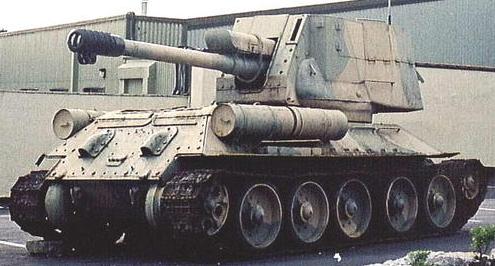
The Egyptian SP122 Self Propelled Gun was developed by the former US Firm BMY Combat Systems, now United Defence LP for the Egyptian Army. The vehicle isn’t purely an American vehicle, but uses the Egyptian Licence built Russian D-30 122mm main gun. The vehicle consists of the chassis of the successful M109 SPG series (M109A2) with an enclosed superstructure on the top (non traverse turret). The decision to use the Russian D-30 was due to the weapon being built for many years under licence in Egypt and thus there being an ample and readiness supply of the munitions for the D-30.
Roughly 124 vehicles have been built, with final vehicles completed in 2000. The vehicle compliments Egypt’s various more capable models of the US M109 SPG. It has not been exported.
It's gun is actually a howitzer, having HE and HESH rounds. As a TD the vehicle must get HESH rounds as basic type, and penetration would be a value based only on the balance. It's because the real penetration of HESH of this gun was 400-460 mm.


- ~45 mm (?)
- 500 hp
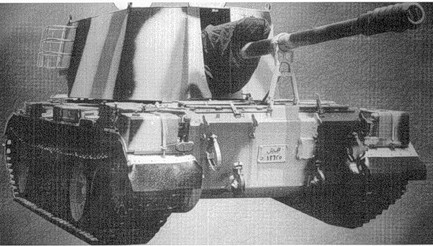
A bit later after the development of T-34/100 it was decided to produce even more powerful upgrade of T-34 - mounting D-30 howitzer in a new turret. Actually it was not 100% new turret, but a modified one of T-34-85. Most of the plates could be opened or removed if needed. A little number of vehicles was built and they served during the 1973 Yom Kipper War against Israel.
It's gun is actually a howitzer, having HE and HESH rounds. As a TD this tank must get HESH rounds as basic type, and penetration would be a value based only on the balance. It's because the real penetration of HESH of this gun was 400-460 mm.


- 200/160/65 mm
- 908 hp
In November 1984, US firm Teledyne Continental Motors (now General Dynamics Land Systems) part of Chrysler Defence, was awarded a contract to upgrade the T-54 for the Egyptian Army, still in large stocks in its arsenal. Among the origins of this idea was the Israeli Tiran conversion, which seems quite satisfactory for Tsahal…
The original project was to be called T-54E (the “E” standing for Egypt) but was subsequently renamed Ramses II, from the most famous conqueror Pharaoh of Ancient Egypt, and third sovereign of the Nineteenth Dynasty. The first prototype was sent to Egypt for extensive firepower and mobility trials in January 1987, until late 1987. By 1989, a technical assistance agreement was signed with Teledyne Continental Motors for additional modifications in the process of more extensive Egyptian testings, commencing in the summer of 1990.
However, by 1998, these additional upgrades had still not led to any production. This second phase, which took years to complete, was accompanied by much more modifications than originally planned (focusing solely on mobility and firepower), and ended with a tank which only superficially bears some resemblance to the T-54 and had in fact more in common with the M60A3, the most current Egyptian tank in service then.
Egypt purchased spare parts for its large M60 fleet and in 1997, thirty M60 series engines from General Dynamics Land Systems ($5,943 million apiece), with more for the planned conversion of the T-54 fleet into Ramses-II MBTs. Eventually, the design was sanctioned by a full conversion order of a first batch of 260 units in 2004/2005, followed by the set-up of a local conversion in an Egyptian tank plant, with some technology transfers. This second phase saw an additional 165 vehicles also planned for conversion. By 2013, an addition conversion order of some 160-180 more was allegedly planned. The overall weight of these converted tanks was 48 tons.
You can find different data about produced Ramses tanks - in particular that there are 260 built ones, but it seems like there were only prototypes to be built. According to defencetalks forum, conversions stopped after 2005 because of the purchase of cheaper additional M60A3s and upgrades packages.


- 520 hp
- 580 hp
Early in 1999, it was revealed that a new 122 mm self-propelled artillery system was entering production in Egypt. This consisted of a modified T-54/T-55 tank chassis fitted with a new all welded steel turret armed with the locally produced 122 mm D-30. But nothing is known if at least a single SPG was built.
It's gun is actually a howitzer, having HE and HESH rounds. As a TD this tank must get HESH rounds as basic type, and penetration would be a value based only on the balance. It's because the real penetration of HESH of this gun was 400-460 mm.